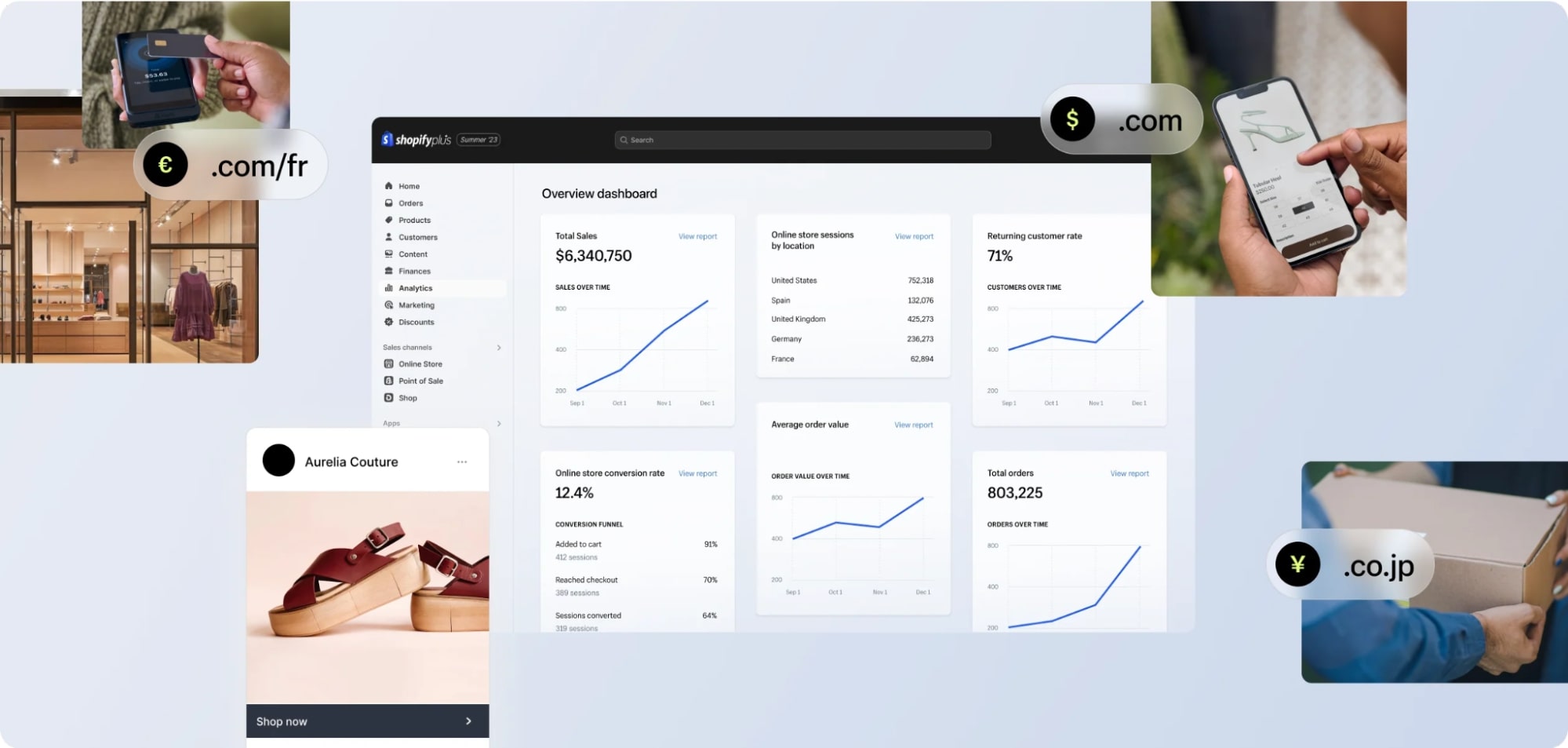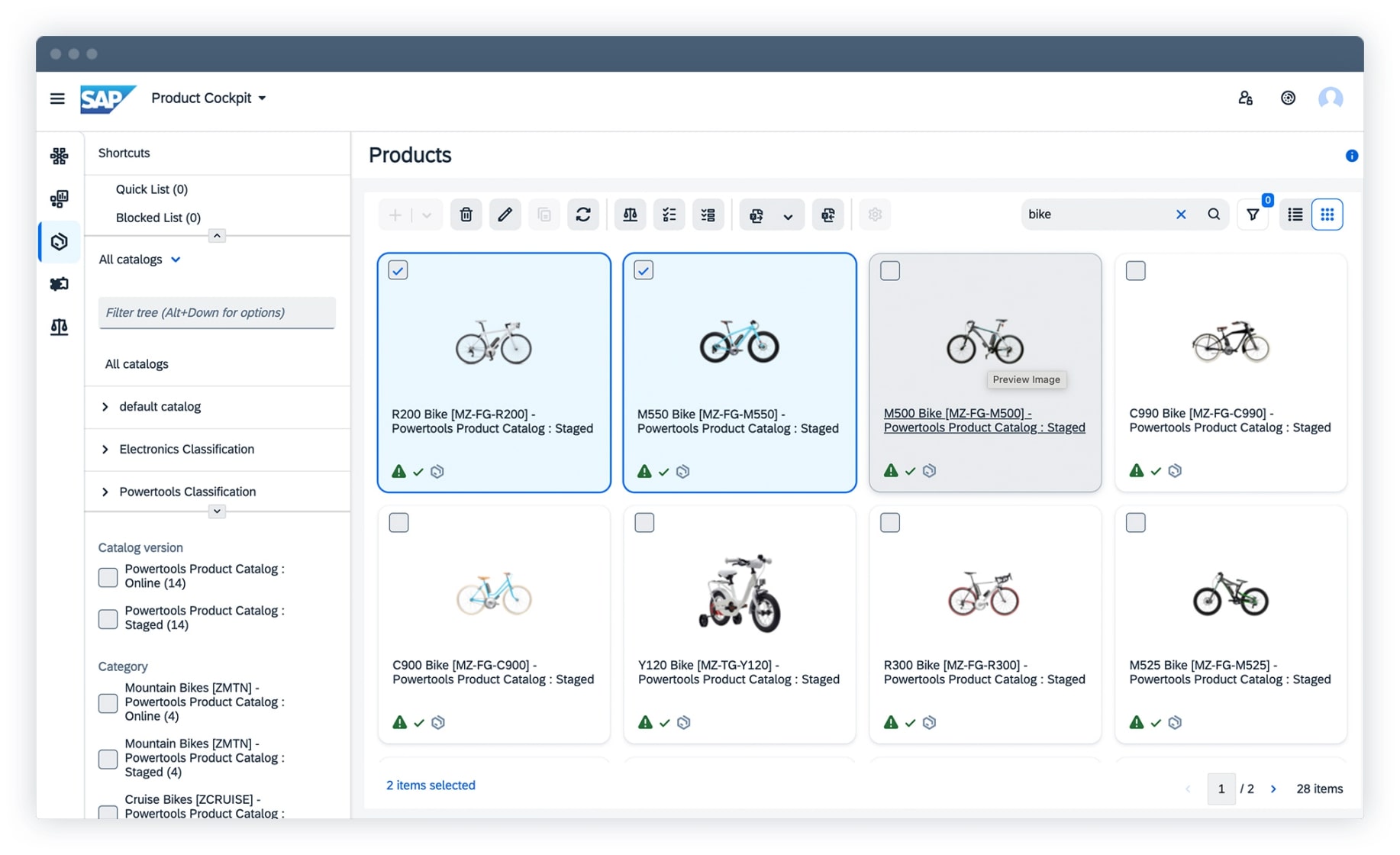Scaling an ecommerce business comes with big challenges—handling high traffic, managing complex operations, and ensuring a seamless customer experience. That’s where enterprise ecommerce platforms come in. Designed for large-scale businesses, these platforms provide the flexibility, security, and power needed to support high-volume sales across multiple channels.
Choosing the right platform starts with understanding your business’s needs. Whether you’re upgrading from a smaller solution or looking to build an ecommerce website that can scale over time, the right foundation makes all the difference.
But with so many options out there, finding the right fit can feel overwhelming. Some platforms excel in customization, while others offer plug-and-play convenience. Pricing, integrations, and scalability all play a role in the decision.
So, how do you pick the best one for your needs?
In this guide, we’ll break down:
- What enterprise ecommerce platforms are and why they matter
- Key features to look for when choosing one
- A comparison of top enterprise platforms, including their features, pros, cons, and pricing
By the end, you’ll have a clear roadmap to selecting the right enterprise ecommerce solution for your business.
[[cta5]]
What Are Enterprise Ecommerce Platforms?
Enterprise ecommerce platforms are high-performance digital solutions built for businesses handling large-scale operations, high traffic, and complex sales processes.
Unlike standard ecommerce platforms, these systems offer advanced features such as multi-store management, global scalability, API integrations, and AI-powered automation to meet the demands of large brands, wholesalers, and B2B companies.
Who Needs an Enterprise Ecommerce Platform?
If your business experiences:
- High transaction volumes (thousands of daily orders);
- Expanding international operations (multiple currencies, languages, and tax systems);
- Complex product catalogs (hundreds to millions of SKUs);
- Custom integration needs (ERP, CRM, inventory management, and marketing automation);
- Multi-channel or omnichannel selling (website, marketplaces, social media, physical stores);
then an enterprise ecommerce platform is the best solution for ensuring scalability, security, and operational efficiency.
Types of Enterprise Ecommerce Platforms
Enterprise solutions come in different forms, each catering to specific business needs:
- SaaS (Software-as-a-Service) – Cloud-hosted platforms like Shopify Plus and BigCommerce Enterprise that offer ease of use and automatic updates.
- PaaS (Platform-as-a-Service) – Flexible cloud-based solutions like Salesforce Commerce Cloud, allowing custom development while managing infrastructure.
- On-Premise & Open-Source – Self-hosted platforms like Adobe Commerce (Magento), providing complete control but requiring dedicated development resources.
- Headless Commerce – Platforms like CommerceTools that separate the frontend and backend, offering unlimited customization and scalability.
The best choice depends on how much control, flexibility, and support your business needs.
Key Features to Consider When Choosing an Enterprise Ecommerce Platform
Choosing an enterprise ecommerce platform is a critical decision that impacts your business’s growth, efficiency, and customer experience. With so many options available, it’s essential to focus on what truly matters. Here’s what to take into account to ensure you invest in a platform that aligns with your needs and long-term goals.
1. Scalability and Performance
An enterprise ecommerce platform must keep up with business growth without compromising speed or stability. As traffic, transactions, and product listings increase, the platform should scale effortlessly to maintain a seamless shopping experience.
Key considerations:
- High traffic capacity – Can the platform handle peak shopping periods without slowdowns?
- Cloud-based infrastructure – Does it offer flexible, on-demand scalability?
- Fast loading speeds – Are there built-in optimizations for performance?
- Global reach – Does it support multiple regions with localized hosting and CDN integration?
2. Customization and Flexibility
Every enterprise business has unique needs, from branding to backend operations. The right ecommerce platform should offer the flexibility to tailor the storefront, checkout experience, and backend workflows to match your specific requirements.
Key considerations:
- Customization options – Can you modify the storefront design, user experience, and checkout process?
- API access and integrations – Does it support third-party tools, ERP systems, and custom apps?
- Headless commerce capabilities – Can the frontend and backend operate separately for greater control?
- Code-level customization – Does it allow for deep backend modifications, or is it a closed system?
3. Security and Compliance
Handling large-scale transactions and customer data comes with significant security responsibilities. A strong enterprise ecommerce platform should offer built-in protections to safeguard sensitive information, prevent fraud, and meet industry regulations.
Key considerations:
- PCI DSS compliance – Is the platform certified for secure payment processing?
- Fraud prevention tools – Does it include AI-driven fraud detection and risk management?
- Data encryption and protection – How does it secure customer data against breaches?
- Regulatory compliance – Does it support GDPR, CCPA, and other data privacy laws?
- Regular security updates – How often does the platform receive patches and security improvements?
4. Multi-Channel and Omnichannel Capabilities
Customers expect a seamless shopping experience, whether they’re browsing on a website, buying through social media, or picking up an order in-store. An enterprise ecommerce platform should support multi-channel and omnichannel selling to unify sales across all touchpoints.
Key considerations:
- Sales channels – Does the platform integrate with marketplaces (Amazon, eBay), social commerce (Instagram, TikTok), and physical stores (POS systems)?
- Unified inventory management – Can you track and sync stock levels across all sales channels in real time?
- Seamless customer experience – Does it support features like buy online, pick up in-store (BOPIS) and cross-channel returns?
- Personalized engagement – Can it provide a consistent brand experience across web, mobile, and offline interactions?
5. Built-In Marketing and SEO Tools
An enterprise ecommerce platform should do more than process transactions—it should help attract, engage, and retain customers. Built-in marketing and SEO tools can streamline customer acquisition and improve organic visibility.
Key considerations:
- SEO optimization – Does the platform allow custom URLs, metadata, schema markup, and fast-loading pages?
- Content marketing support – Can you create and manage blogs or landing pages for campaigns?
- Email and automation tools – Does it offer built-in email marketing, abandoned cart recovery, and customer segmentation?
- Loyalty and promotions – Are there features for discounts, referral programs, and personalized offers?
- Third-party integrations – Can it connect with major ad platforms, analytics tools, and CRM systems?
6. Integration with Business Systems
An enterprise ecommerce platform should seamlessly connect with your existing tools and workflows to ensure efficient operations across all departments. From inventory management to customer relationship management (CRM), smooth integrations are key to reducing manual work and improving data accuracy.
Key considerations:
- ERP and CRM compatibility – Does the platform integrate with leading ERP (SAP, NetSuite) and CRM (Salesforce, HubSpot) systems?
- Payment and tax processing – Can it connect with multiple payment gateways and handle global tax compliance?
- Inventory and order management – Does it sync stock levels across warehouses and fulfillment centers?
- Marketing and analytics tools – Can it integrate with Google Analytics, email platforms, and advertising networks?
- Custom API support – Does it allow businesses to build custom integrations if needed?
7. Support and Maintenance
Reliable support and ongoing maintenance are essential for keeping an enterprise ecommerce platform running smoothly. Whether it’s resolving technical issues, implementing updates, or scaling operations, businesses need a platform with strong, accessible support.
Key considerations:
- 24/7 customer support – Does the platform offer round-the-clock assistance via chat, phone, or email?
- Dedicated account management – Are enterprise clients assigned a dedicated representative for personalized support?
- Regular updates and security patches – How frequently does the platform release updates to improve performance and security?
- Developer resources and documentation – Does it provide clear API documentation, training materials, and a developer community?
- Managed hosting and maintenance – For SaaS platforms, does the provider handle server maintenance and uptime monitoring?
These features determine how well the platform can scale with your business while ensuring a seamless shopping experience. Next, let’s compare the top enterprise ecommerce platforms based on their features, pros, cons, and pricing.
Top Enterprise Ecommerce Platforms
With so many enterprise ecommerce platforms available, choosing the right one requires a careful look at their features, strengths, and potential drawbacks. Below is a breakdown of some of the leading enterprise ecommerce platforms, covering what they offer, their advantages, challenges, and pricing.
1. Shopify Plus

Shopify Plus is a fully hosted enterprise ecommerce platform designed for high-growth brands and large businesses. It offers scalability, automation, and an intuitive user experience, making it ideal for companies that want a powerful yet easy-to-manage solution.
With its cloud-based infrastructure, Shopify Plus eliminates the need for manual server maintenance, allowing businesses to focus on growth.
Key Features:
- Unlimited bandwidth and cloud hosting for high traffic
- Shopify Flow and Scripts for automation and custom workflows
- Multi-storefront and global selling capabilities
- Seamless integration with marketplaces and social commerce
Pros:
✔ User-friendly and quick to launch✔ Built-in automation and multi-channel support✔ 24/7 priority support with a dedicated account manager
Cons:
✖ Limited backend customization compared to open-source platforms✖ High transaction fees if not using Shopify Payments✖ App dependency for advanced features
Pricing: Starts at $2300/month, scaling with business needs.
Best For: Brands looking for a scalable, low-maintenance platform with automation and multi-channel capabilities.
2. BigCommerce Enterprise

BigCommerce Enterprise is a scalable, API-driven ecommerce platform built for high-growth businesses.
It offers flexibility, advanced SEO, and multi-storefront capabilities, making it a strong choice for brands that need customization without the complexities of open-source solutions.
Key Features:
- API-first architecture for headless commerce and integrations
- No transaction fees on any payment gateway
- Advanced SEO and marketing tools
- Multi-storefront management under a single account
Pros:
✔ Highly customizable without requiring deep coding expertise✔ Strong SEO and marketing features to improve visibility✔ Supports both B2B and B2C businesses with advanced functionality
Cons:
✖ Fewer free themes and templates compared to competitors✖ Some advanced features require developer support for full customization
Pricing: Custom pricing based on business size and sales volume.
Best For: Businesses looking for a scalable, flexible ecommerce solution with robust SEO and multi-channel selling capabilities without high transaction fees.
3. Adobe Commerce (Magento)

Adobe Commerce (formerly Magento) is a highly customizable, open-source ecommerce platform built for enterprises with complex needs. It offers full backend control, multi-store capabilities, and AI-driven personalization, making it ideal for businesses that require deep customization and scalability.
Key Features:
- Open-source flexibility with full code customization
- AI-powered product recommendations and personalization
- Advanced multi-store, multi-language, and multi-currency support
- Scalable infrastructure for high traffic and global operations
Pros:
✔ Unmatched customization with complete backend control✔ Strong B2B and B2C capabilities for complex business models✔ Large extension marketplace and active developer community
Cons:
✖ High development and maintenance costs✖ Steep learning curve requiring technical expertise
Pricing: Magento Commerce pricing starts at $1,999/month, varying based on business size and platform needs.
Best For: Large enterprises needing full customization, scalability, and advanced B2B/B2C functionality with the resources to manage development and hosting.
4. Salesforce Commerce Cloud

Salesforce Commerce Cloud is a cloud-based enterprise ecommerce platform designed for brands that prioritize AI-driven personalization and seamless CRM integration. It’s ideal for businesses already using Salesforce products and looking for deep customer insights.
Key Features:
- AI-powered recommendations and predictive analytics with Einstein AI
- Cloud-based scalability for high traffic and global expansion
- Omnichannel selling with seamless integration across digital and physical stores
- Built-in CRM, marketing, and customer data management
Pros:
✔ Advanced AI-driven personalization for tailored customer experiences✔ Deep integration with Salesforce ecosystem for unified data management✔ Scalable infrastructure supporting high-growth businesses
Cons:
✖ High cost compared to other platforms✖ Requires technical expertise for customization
Pricing: StoreConnect pricing starts at $295/month, with higher tiers reaching $6,495/month, plus a shared success fee per order (0.2%–1%), making it a flexible but volume-based cost model.
Best For: Large businesses focused on personalization, data-driven insights, and omnichannel commerce, especially those already using Salesforce.
5. SAP Commerce Cloud

SAP Commerce Cloud is an enterprise-grade ecommerce platform designed for complex B2B and B2C businesses. It offers deep ERP integration, AI-powered insights, and omnichannel capabilities, making it ideal for large enterprises managing global operations.
Key Features:
- Seamless integration with SAP ERP, CRM, and supply chain systems
- AI-driven customer insights and personalized experiences
- Advanced order management for multi-channel sales
- Scalable cloud-based infrastructure for high traffic and global expansion
Pros:
✔ Strong B2B and B2C capabilities for complex ecommerce models✔ Deep enterprise system integration for supply chain and finance management✔ AI-powered analytics for enhanced customer engagement
Cons:
✖ Steep learning curve requiring specialized knowledge✖ High implementation and maintenance costs
Pricing: Custom pricing based on enterprise requirements.
Best For: Large enterprises needing robust ERP integration, advanced B2B/B2C functionality, and AI-driven commerce solutions.
[[cta5]]
Conclusion
The best enterprise ecommerce platform depends on your business needs.
Shopify Plus and BigCommerce Enterprise are great for fast-growing brands that want ease of use, while Adobe Commerce and SAP Commerce Cloud offer deep customization for complex operations.
Salesforce Commerce Cloud is perfect for AI-driven personalization, and StoreConnect is a smart pick for Salesforce users.
If you want quick setup and automation, go for Shopify Plus or BigCommerce.
Need full control? Adobe Commerce or SAP Commerce Cloud are your best bet.
Already in the Salesforce ecosystem? Salesforce Commerce Cloud or StoreConnect make integration seamless.
Bottom line: pick a platform that fits your growth plans, tech stack, and budget—and one that won’t give you headaches down the road.
Turns out the size actually does matter!






.avif)


.avif)



.jpg)
.jpg)